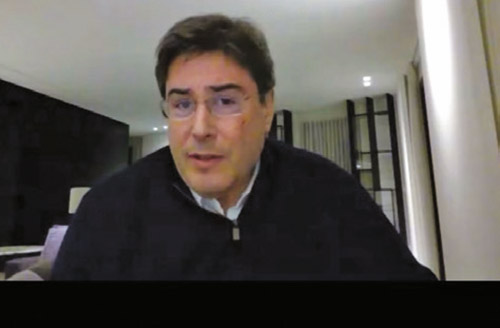





On February 24, UJA leadership approved an emergency grant of $3 million to support Ukraine’s 200,000 Jews, in partnership with the Joint Distribution Committee (JDC) and the Jewish Agency for Israel (JAFI). On March 1, UJA-Federation of New York hosted a virtual real-time update on the situation, featuring experts from these partners.
Amy Bressman, UJA-Federation of New York president began: “It speaks strongly to the commitment of our supporters across the United States to have over 5000 on this very timely and important briefing. This is a perilous and dangerous moment. We are heartened by the extraordinary resilience of the Ukrainian people and the unified global response supporting them against the Russian invasion. But the reality is that there is already a staggering humanitarian crisis with thousands of displaced persons fleeing the conflict and millions trapped inside their homes and fighting on the front lines at grave risk of injury and death.”
Mark Levin, executive vice chairman and CEO of the National Coalition Supporting Eurasian Jewry, shared a letter from President Volodymyr Zelensky’s office. “We are calling on all international friends of Ukraine for support. We need more weapons to protect our children, culture and communities. We need the powerful support of the State of Israel. There are 6,000 Israelis in our country and 200,000 Jews in its vibrant Jewish community needing support.”
Levin added that before the invasion, “Putin has done more to unite Ukraine than any Ukrainian political leader has done over the last 30 years. … “I want to discuss one of the more egregious justifications Vladimir Putin has used for the Russian invasion of Ukraine. Putin’s allegation that Ukraine is being led by a fascist neo-Nazi and an antisemitic government has no basis. Russia abused this argument for years; if today’s situation wasn’t so tragic and dire, this allegation would be laughable.
“Ukraine is led by a Jewish president. The defense minister is Jewish, as is the president’s chief of staff. At one point, Ukraine not only had a Jewish president, but also a Jewish prime minister. In the last three months. the Ukrainian Parliament twice passed major legislation on antisemitism.”
Stefan Oscar, executive director for the JDC’s former Soviet Union operation, explained that they have kept the communication with staff, social welfare clients and partners on the ground. “I can report to you that we are doing pretty well. We’re trying to be in touch with thousands daily to continue vital services of bringing medicine and food to 90% of our clients where they live.”
Many crossed borders to Poland, Romania, Hungary, or Slovakia. But the vast majority of Jews are still in their homes, underground, in shelters, or in subway stations.” Oscar’s colleague Lena, working for the JDC in Odessa for 23 years, said, “The best part of my job is actually welcoming people to Odessa to see how great our Jewish community is, to enjoy the Odessa Jewish community spirit, to see how we sing and to try the best dishes that we cook here.” She added: “Yesterday, I went on home visits. One woman, born in 1934, said she never imagined that she would have to go to the basement again to hide from bombing.”
JAFI’s Managing Director Roman Polonsky, born in a small city near Odessa, explained: “We are Ukrainians, Russians and Moldavans—no distinction within them. If somebody asked me 10 years ago, what was more probable, Martians invading Earth or Russia into Ukraine, I wouldn’t have hesitated—Martian invasion. Now the unthinkable is happening. Our deployment in Ukraine of 90 local workers focuses on saving Jewish lives, bringing Jews to neighboring countries or those who want to make aliyah. Men, ages 18-60, can’t leave, because they are eligible for Ukraine’s army.”
UJA-Federation of New York CEO Eric Goldstein told attendees that the Tisch family in New York was giving a generous donation for emergency support. The Tisch family noted: “The true hero in our family was our great-grandfather, who left the Ukraine in March 1904 to go to Hamburg to come to America. Six months later, he brought his wife and two daughters. He could have stayed in Ukraine or could have gone to Warsaw. Either way, things would have been very different for all of us.” Goldstien added: “It’s hard not to reflect at the moment. A Jewish Agency representative at the Warsaw airport, who grew up in Warsaw, mans a booth helping Ukrainian Jews wanting to immigrate to Israel. Imagine if that booth had been there 80 years ago.”
Mark Wilf, Jewish Federations of North America’s chair of the board of trustees, concluded: “At this time of darkness, Federations are rallying once again, to deliver light and hope to our family in Ukraine. These are extraordinary needs that demand the extraordinary response we have mobilized. I urge you to contact your local Federation and donate to our collective effort.”
By Judy Berger









